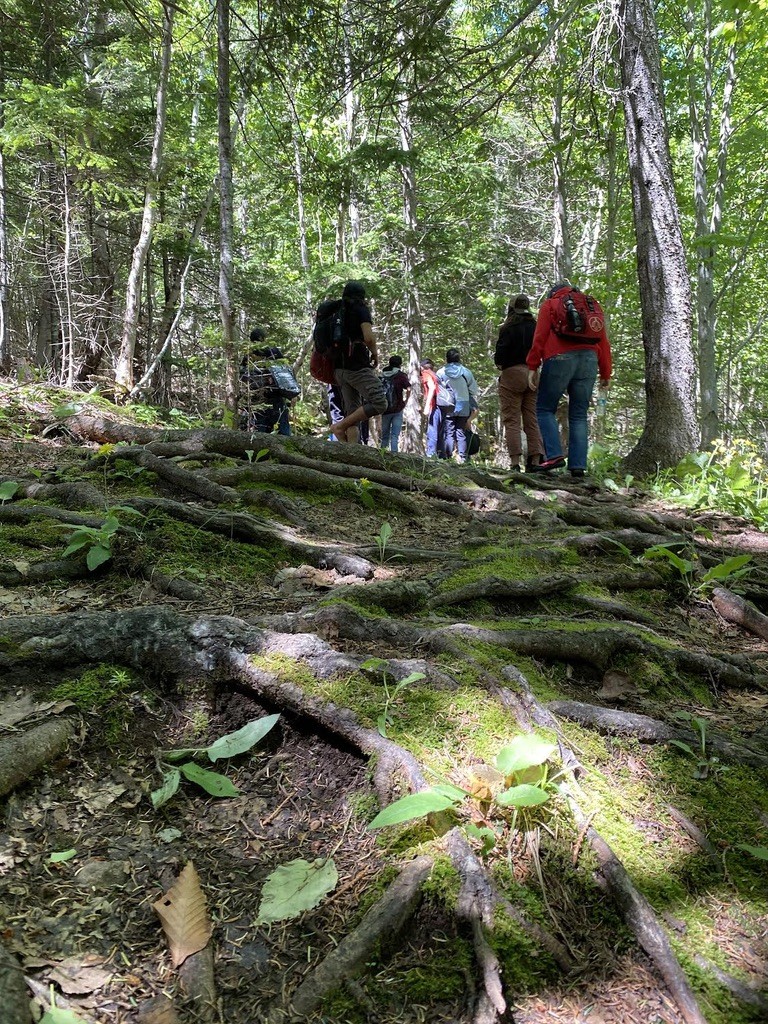Darrell Bernard wants to give a sacred space in Unama’ki (Cape Breton) the respect it deserves with its traditional Mi’kmaw name.
Darrell spoke about the work he has done to collaborate with the province to change the name of a mountain currently named Kellys Mountain to its original Mi’kmaw name – Mukla’qati – which means ‘where the geese land.’
“There is so much potential for our communities to be able to tell their story,” said Darrell, Infrastructure Program Manager with the Union of Nova Scotia Mi’kmaq (UNSM).
At the Tripartite Forum’s Culture and Heritage Committee meeting at the Kluskap Ridge RV and Campground, he explained that there’s no meaningful reason behind the mountain’s current name: “With the research we’ve done, there’s no Kelly family associated with the mountain, and there’s no person named Kelly that’s worth naming a mountain after.”
New Signs
Darrell told committee members the plan is to put up a large sign on either side of the mountain, designating it as Mukla’qati, along with smaller signs on the lookoff with QR codes, linking to positive stories about the Mi’kmaq People, their history, culture and communities.
He noted there is great potential for economic benefits in being able to tell the traditional story of Mukla’qati, “a story that has yet to be told”
Two-Eyed Seeing Approach
The choice of a new name for Kellys Mountain respects the traditional principle of Etuaptmumk (Two-Eyed Seeing), Darrell noted, adding that it serves as an educational tool to explain the rich historical context of the sacred mountain. A renamed mountain als respects the history of the region – including the darker chapters in Mi’kmaw history, like the dispossession of traditional territory.
“I know (dispossession) is not a comfortable word…but it’s a fact that it happened, and we need to recognize that,” Darrell said.
When installed, the signage will tell the pre-contact history of the region, before dispossession and centralization – history that includes the Glooscap legends associated with the mountain, like the Story of the Stone Maidens.
“That’s why I talk about this. We came from places, we lived in places and we had communities in these places – Membertou is not a 20,000-year-old neighbourhood,” Darrell said. “It’s important to recognize we had communities, where we lived sustainably on the land.”
Cleanup
The plan also entails the removal of garbage and graffiti. Darryl said the state of the highway that runs through Kellys Mountain – plagued with graffiti on the guardrails and a glut of garbage – has been a matter of concern for him and his fellow UNSM members since 2021, when they came up with the plan.
“We talked about how sacred the mountain is to our people, and how important it was to our ancestors, and how it’s not respected at all, with the graffiti and the garbage that is dumped down to the bottom of the St. Ann’s Lookoff,” he told the Culture and Heritage Committee.
“It’s not Tim Horton’s cups that blew out of cars; it’s couches and roofing shingles dumped over the end of the lookoff, so I was asked to approach the province to see if they would do a couple of things with it.”
Problematic Names
The name change for the mountain is an ongoing effort in collaboration with Service Nova Scotia.
“Turns out, a name change is a bigger issue than putting a sign on there that says the name, where ‘Kellys Mountain’ used to be,” Darrell said.
He stressed that the renaming process for the mountain reminded him of the dire need to change many inappropriate place names across Canada.
“These are changing times. There are so many places that need to have their names changed because there are inappropriate, racist names,” Darrell noted.
Support
Darrell told committee members the project has the support of the tourism industry, noting the potential with guided hikes already taking place on Mukla’qati.
“It’s sustainable, good for the tourism industry and a good reconciliation project,” he said. “It’s a win-win for everybody to get this done.”
Darryl said the province and Destination Cape Breton have been helpful partners, contributing significantly to the costs of designing the signs and the general redevelopment effort.
“It’s our story, nobody else can tell this story. We need to take ownership of our stories and show that this is where Glooscap called home – on Mukla’qati, on this sacred mountain.”

